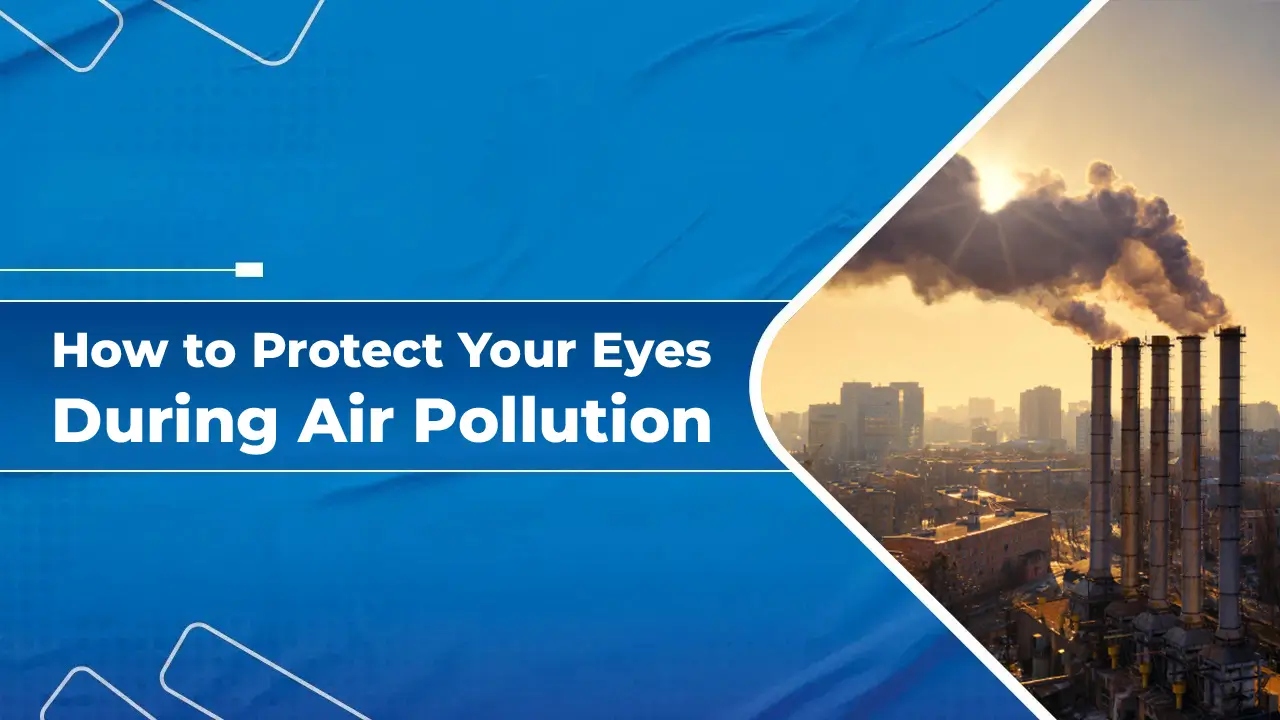
Air pollution has been turning cities into gas chambers. We frequently hear how it has been causing respiratory issues and skin ailments among residents. However, we tend to overlook eyes – how polluted air can harm our eyes. Smog, dust, smoke, and chemical pollutants present in polluted air can cause irritation, redness, dryness, and even long-term damage to your eyes. Hence, it is essential to be cautious and take due care to protect your eyes from the harmful effects of air pollution.
1. Wear Protective Eyewear Outdoors
We often see people wearing masks as protection against harmful microbes and air pollution. What face masks do for your respiratory system, eyeglasses can do for your eyes. It is a simple yet effective way to shield your eyes from airborne pollutants. Whenever you step outside, make sure you wear wraparound sunglasses or protective eyewear. It is especially important to keep your eyes covered when you are travelling in an open vehicle. Sunglasses also shield your eyes from the harmful ultraviolet rays of the sun.
2. Avoid Rubbing Your Eyes
When pollution is high, your eyes may feel itchy or watery. The natural urge is to rub them to relieve irritation. But no matter how hard you rub, you will not get any relief. In fact, rubbing may further increase irritation. It may also give rise to a burning sensation in your eyes. Apart from that, you might have forgotten to wash your hands before touching your eyes. This may cause eye infections by transferring bacteria and other allergens to your eyes. What you should do is consult an eye care specialist to get a prescription for eye drops to soothe irritation.
3. Use Lubricating Eye Drops
Air pollution can dry out the natural moisture in your eyes, leading to dryness and discomfort. Lubricating or artificial tear drops easily available over-the-counter can help restore moisture and create a protective layer on the eye surface. Choose preservative-free drops if you need to use them more than 3-4 times a day. Always carry your eye drops with you so that you can use them whenever you want – to keep your eyes moist and healthy. It also helps relax the muscles of your eyes.
4. Use Cold Compresses
Another way to get relief from the inflammation and irritation occurring as a result of exposure to air pollution is by using cold compresses. Just take a clean cloth, soak it in cold water, and place it on your eyes. Alternatively, you can take some ice cubes, place them in a clean handkerchief or cloth, and place it on your eyes. It is a great remedy to get relief from itching and burning in eyes.
5. Drink Adequate Water
You know the human body is 70% water. Drinking enough water and fluids helps keep not only your body hydrated but also your eyes. Aim for at least 8-10 glasses of water each day. When your body is dehydrated, tear production in eyes can decrease, making them more vulnerable to dryness and irritation caused by pollutants. Drinking adequate water also helps flush out toxins and waste from your body.
6. Stay Indoors During Peak Pollution Hours
Air quality tends to be excessively poor during early mornings and evenings. It is more so in winter months due to fog and smog. Avoid stepping outdoors during these hours. Keep a watch on the air quality index in your city. Keep windows closed when outdoor air quality is poor. If possible, you can also use an air purifier at home to maintain clean air indoors, especially if you have children or elderly family members.
7. Practice Proper Eye Hygiene
Pollutants often accumulate on your hands, face, and clothes. Wash your face and eyes gently with clean water after entering indoors. It will help remove any pollutants that might have collected on your eyes. Clean your eyelids and eyelashes with a cotton pad soaked in lukewarm water or use a mild eyelid cleanser if you are prone to allergies or infections.
8. Eat Eye-Friendly Foods
A diet rich in vitamin A, C, E, omega-3 fatty acids, and antioxidants can help maintain eye health. Try including carrots, green leafy vegetables like spinach, fish, nuts, and citrus fruits in your diet. It will help support your eyes’ natural defenses and reduce the impact of oxidative stress caused by environmental pollution.
9. Limit Screen Time
Staying glued to digital screens – computers, laptops, tablets, and smartphones, can lead to dryness in eyes. It may compound your symptoms caused by air pollution. You may experience more itching, irritation, watering, and burning in eyes. A simple way out here is to follow the 20-20-20 rule: look at something 20 feet away after every 20 minutes. It will give your eyes the much-needed relaxation and help replenish the tear film.
10. Consult an Eye Specialist If Symptoms Persist
If you experience persistent redness, burning, or blurred vision during high pollution periods, don’t ignore it. These could be signs of allergic conjunctivitis or dry eye syndrome that may require medical attention. An eye care specialist in Chandigarh can recommend appropriate treatment and preventive care. Additionally, make regular eye checkups a part of your life. Such routine examinations can help detect any eye issues early so that you can get timely treatment and protect your eyes.
Conclusion
You know that eyes are a very sensitive part of your body. What you need to understand in modern times is that eyes need extra protection from the toxic effects of air pollution. Taking a few proactive steps can go a long way in maintaining your eye health. Stay aware, stay protected, and never take your vision for granted.
